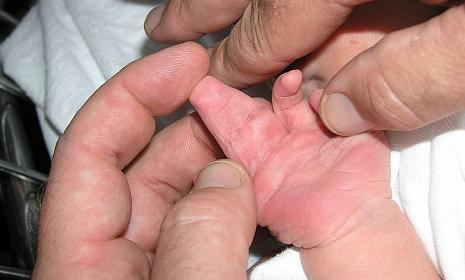Indian researchers develop a device that promises to reduce new-born deaths significantly. The solution addresses the issue of hypothermia – where body rapidly loses temperature, which is one of the major causes of neonatal deaths. The device constantly monitors the body temperature of babies and alerts the doctor on his/her mobile if it goes down below the threshold limit.
Shillong (ISW) – India had a neonatal mortality rate of 25.4 per 1,000 live births last year. In other words, an average of little more than 25 children out of 1,000 live births died within 28 days of their births. It is far above the global average of 19 per 1,000 live births recorded last year.
A group of researchers at the Indian Institute of Science (IISc), Bangalore have come up with a solution that promises to reduce new-born deaths significantly. The solution addresses the issue of hypothermia, which is one of the major causes of neonatal deaths. Hypothermia is a medical condition where body rapidly loses temperature. Premature babies, are highly vulnerable to develop the condition as they do not have enough body fat.
The solution is in the form of a small device. It works by constantly monitoring the baby’s body temperature and alerts the doctor if it goes down below the threshold limit. The device is designed to stream temperature data to the treating paediatrician through a mobile phone so that immediate corrective measures could be taken as and when temperatures drop to dangerous levels.
The device is required to be placed next to the baby’s body near the navel, taped on to the body, said Dr. Amrutur Bharadwaj, leader of the research team and Chairman of the IISc’s Robert Bosch Centre for Cyber Physical Systems.
The device also consists of an accelerometer to keep a track of what angle the baby is being held. “This is essential to ensure that the child is able to breathe properly. Under no circumstance, the baby should be lying on its stomach,” Dr. Bharadwaj added.
The device has been tested successfully on 80 children. It has been developed in association with St Johns Research Institute and St. John’s Medical College in Bangalore.
“The device would be particularly useful in rural areas, where there is lack of adequate neonatal intensive care units (NICUs). In urban centres, it is possible to keep the babies in NICUs for days on end. But, it is not the case in the rural set up. The device in a way will be like taking NICUs to the homes of the needy babies,” he said.
Dr. Bharadwaj made a presentation on the device at the annual meeting of the Indian Academy of Science, which is currently on at the North East Hill University (NEHU), Shillong. Over 160 scientists from different parts of the country are participating in the meeting, which began on Friday.


